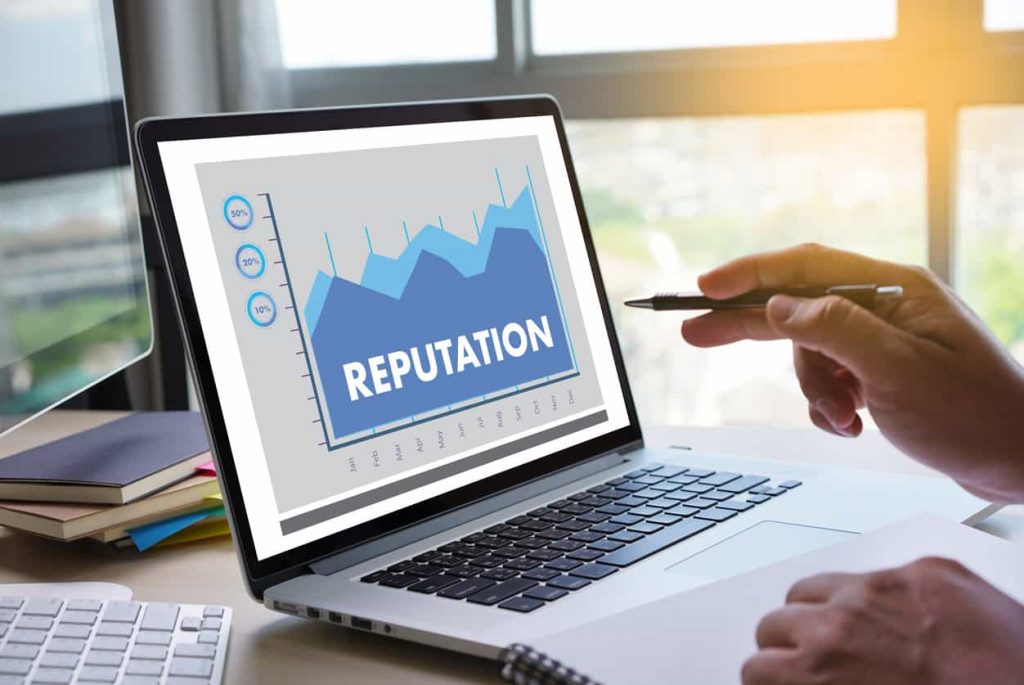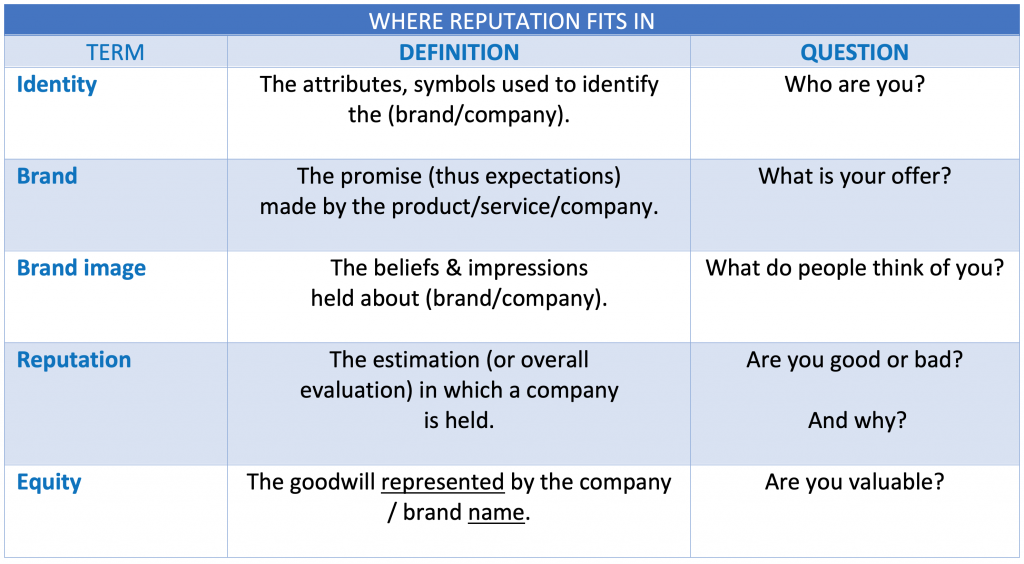While proponents of brand marketing have more recently aimed to incorporate ideas like purpose, brand marketing is essentially a customer or buyer-focused construct at its core. At its heart, effective marketing is like the movie industry, built on illusion. It is about creating stories that are grander than reality. Unfortunately, these stories don’t always sit well with reputation building and management.

Brand marketing is about driving sales and building brand equity centered on the added value created for a branded product or service over and above an unbranded version.
Boards need to give marketing some guardrails and direct them to shift from short-term sales to a custodianship mindset based on deep knowledge of stakeholder values and how your company and products/services relate to these values currently and potentially.
Why does this matter?
There are fundamental differences between brand and marketing thinking and reputation thinking. Unless fully understood, organisations can come unstuck if they drive branding and reputation from the tandem of brand and marketing. Marketing prioritises sales and profits. Gut feel instinct and risk-taking are endemic to marketing’s culture. These are not bad things for reputation management when tempered by considering the consequences of marketing’s actions. However, marketers’ values are often not aligned with the values of stakeholders.
Branding can underpin a good reputation
Investments are made in brands by marketers building carefully designed associations and meaningful emotional connections with customers. These associations can add to reputation if truthful as well as undermine reputation if false or disingenuous.
Branding principles can’t help build a good reputation. A reputation includes the outcomes of brand marketing incorporating the associations and feelings marketing builds up over time through advertising and other activities. Brand or Product marketing increases visibility and awareness; hence can be the first base to having a reputation rather than not having any reputation. Reputation building is so much more.
Reputation is an overall evaluation of the known actions of a company/organisation, its inferred motivations, and perceived values. At its heart, reputation is a value judgement about being essentially good or bad, which depends on each stakeholder’s values. Thus, reputation applies to more than customers or buyers. It is relevant to all the stakeholders associated with your company and its products/services: employees, analysts, media, government, civil society, and many more stakeholder cohorts.
Reputation matters because the better the reputation, the more confidence stakeholders have in a company and their branded products/services, and the more support they are likely to give it. Ultimately, reputation represents a licence to operate that can be withdrawn or restricted. The value of fostering a good reputation is characterised by increased willingness to engage, be listened to, and be given the benefit of the doubt when a crisis emerges. In addition, it drives what stakeholders say about you to others, including customers and, therefore, product/service sales.
Brand tracking is the measurement of whether what you want to say is getting through and resonating. Reputation is influenced by a broader range of influences than brand and marketing, though also by brand and marketing. Reputation is much less about the practical and emotional value derived from consumption or customer experience and more about corporate capability perceptions (innovation, financial performance, and strategy), ethical behaviours, good citizenship, good governance, and a favourable persona.
All the pillars have to be in place for a company to have a good reputation. For example, a company can’t have a good reputation if it is incompetent, untrustworthy, unethical, or disliked. So the reputation scorecard must be balanced in all areas.
Marketing activities can boost reputation by creating a more positive persona (e.g., dynamic, authentic, caring), though only if backed by reality.
What do you need to do?
Regular audits of stakeholder values, perceptions, and corporate reputation are needed now more than ever. This understanding will locate blind spots that hamper success, which won’t come from marketing’s primary tool for monitoring, i.e., brand tracking.
A broader range of stakeholders are more influential than ever before: regulators, government, media, influencers, analysts. It is easier than ever for stakeholders from all walks of life to get information about your products, services, and the companies behind them. It is much easier for anyone to become an activist.
Without regular audits of values, expectations, perceptions, and reputation, there are blind spots that can catch up with your companies and branded products/services quick as a flash. Take Crown Casinos and Resorts, for example; an audit of stakeholders could have highlighted the risks in the business model well before it played out. It is harder to hide from the truth when an independent survey is reported at a preset time and presented and made public to the board, Executive Leadership Team and staff more broadly. Even more important is to report reputation metrics in publicly disclosed annual reports. As a result, expected behaviours could have been understood and changes implemented. Furthermore, by including internal stakeholders, gaps are seen between internal and external stakeholders, and risks are identified without incriminating individuals if such audits were confidential and at arm’s length.
It’s not just companies, products, and services in high-risk product categories that need this knowledge. It is also those who strive to reach a high standard competing through their reputation. Companies and organisations like airlines, education providers, health care providers, insurers, law firms, ethical medical products, and professional associations benefit from stakeholder reputation audits to understand their assets, liabilities, risks, and opportunities to build competitive advantage.
More about how brand and reputation are distinct
Some definitions may help you navigate this complex field of terminology and help clarify the differences between brand and reputation. We acknowledge Inside Story collaborator, Professor Grahame Dowling, for some definitions below.

If you are interested in learning more about reputation auditing, stakeholder surveys, or qualitative research, don’t hesitate to contact Liane Ringham at [email protected] and see our Corporate Reputation webpage.


